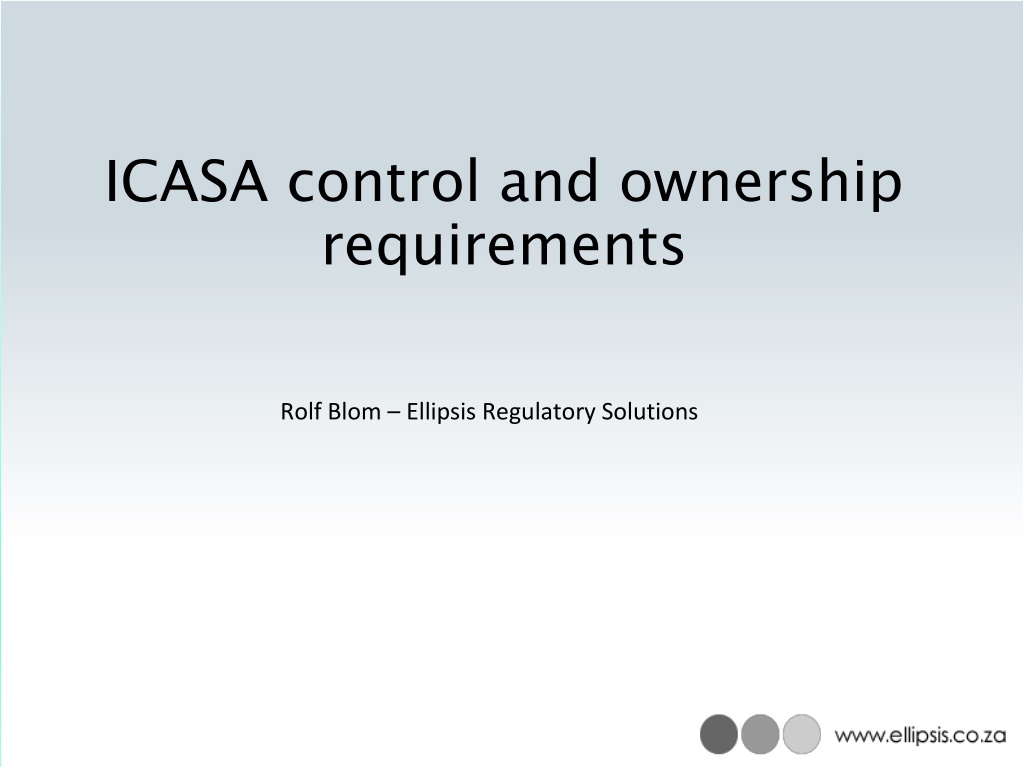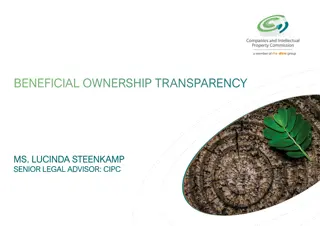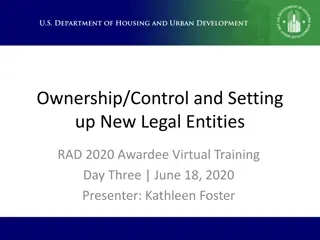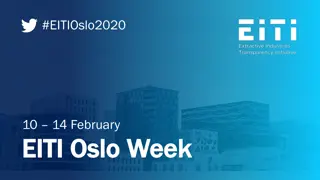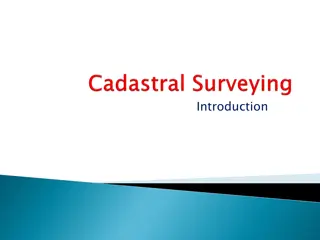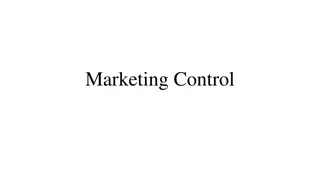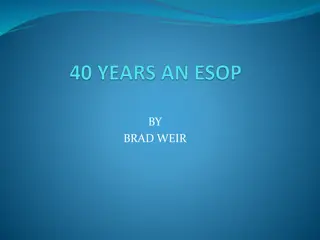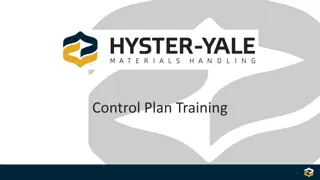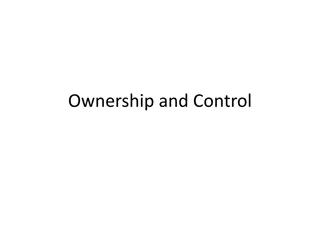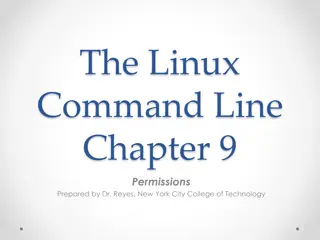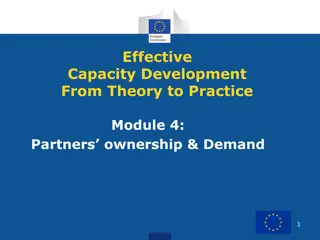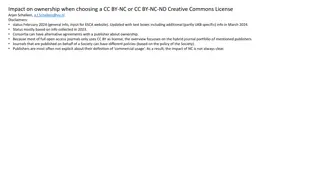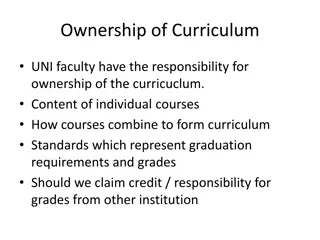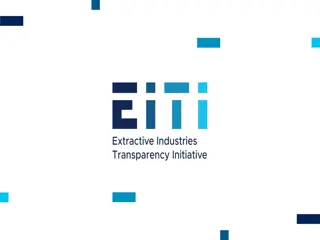Understanding ICASA Control and Ownership Requirements
In South Africa, the Independent Communications Authority of South Africa (ICASA) regulates the licensing framework for electronic communications services. ICASA's mandate involves establishing licensing frameworks, promoting ownership by historically disadvantaged groups, and supporting black economic empowerment. This includes setting limits on individual licenses to ensure equitable ownership and control. The Electronic Communications Act outlines the requirements for promoting broad-based black economic empowerment, with a focus on historically disadvantaged groups, women, youth, and persons with disabilities.
Download Presentation

Please find below an Image/Link to download the presentation.
The content on the website is provided AS IS for your information and personal use only. It may not be sold, licensed, or shared on other websites without obtaining consent from the author. Download presentation by click this link. If you encounter any issues during the download, it is possible that the publisher has removed the file from their server.
E N D
Presentation Transcript
ICASA control and ownership requirements Rolf Blom Ellipsis Regulatory Solutions
Why do we find ourselves here? ICASA and the ICASA Act, No.13 of 2000 Electronic Communications Act, No. 36 of 2005 ICASA s mandate Establishes the licensing framework Communications Communications Network Service (ECNS) licences (also Broadcasting Services ) Electronic Service (ECS) & Electronic Class and Individual licences Every organ of state and public entity must apply any relevant code of good practice issued in terms of this Act (a) in determining qualification criteria for the issuing of licences, concession or other authorisations in respect of economic activity in terms of any law Section 10(1)(a) of the Broad-Based Black Economic Empowerment Act, No 53 of 2003
Regulators must be able to regulate The Authority may make regulations with regard to any matter which in terms of this Act or the related legislation must or may be prescribed, governed or determined by regulation Section 4(1) of the ECA the Authority may by regulation, set a limit on, or restrict, the ownership or control of an individual licence, in order to promote the ownership and control of electronic communications services by historically disadvantaged groups and to promote broad-based black economic empowerment Section 13(3)(a) of the ECA & specific to individual licensees
ICASAs B-BBEE mandate & Individual licensees Object of the ECA is amongst other things to promote broad-based black economic empowerment, with particular attention to the needs of women, opportunities for youth and challenges for persons with disabilities Section 2(h) of the ECA The Authority must include the percentage of equity ownership to be held by persons from historically disadvantaged groups, which must not be less than 30%, or such other conditions or higher percentages as may be prescribed Section 9(2) of the ECA & specific to individual licensees An individual licence must not be let, sublet, assigned, ceded or in any way transferred, and the control of an individual licence may not be assigned, ceded or in any way transferred, to any other person without the prior written permission of the Authority Section 13(1) of the ECA & specific to individual licensees
Where does this leave us? ICASA is bound and mandated by statute with the ability to make regulations, required to promote and impose obligations related to B-BBEE and ownership of individual licensees by HDGs. A minimum of 30% equity ownership by HDGs for individual licensees: Applying for a new individual licence (subject to ministerial directive an/or ITA); Transferring or transferring control of an individual licence; Renewing an individual licence; or Amending an individual licence. No definitions of historically disadvantaged group , ownership or control to be found in either the ICASA Act or ECA.
A time for regulations 2003 Regulations in respect of the Limitation of Ownership and Control of Telecommunication Services Passed under the now-repealed Telecommunications Act, No 103 of 1996; Comprehensive definition of HDG aligned with the language of section 9 (Equality Clause) of the Constitution/Bill of Rights; Defines control interest Defined ownership interest 2017 discussion document, 2019 findings document and 2020 Draft Regulations in respect of the Limitations of Control and Equity Ownership by Historically Disadvantaged Groups (HDG) and the application of the ICT Sector Code Defines HDG ; Defines control as being that defined in the Competition Act; Defines control interest ; and, Includes definitions for related concepts transfer , transfer of control interest and subsidiary
A time for missed opportunities Regulations in respect of the Limitations of Control and Equity Ownership by Historically Disadvantaged Groups (HDG) and the Application of the ICT Sector Code Commenced upon publication on 31 March 2021 Provides no explicit definitions for either control or ownership Equity is defined as the instrument by which a person holds right of ownership in an entity HDG defined in Appendix 1 to the Regulations, which provides a methodology for the compilation of credible assurance reports : Black People with meaning assigned in the B-BBEE Act as a generic term which means Africans, Coloureds and Indians ; Women, who are citizens of South Africa; People with disabilities, who are citizens of South African; and/or Youth, who are citizens of South Africa [people between the ages of 14 35 per the National Youth Development Agency Act, 2008]
Equity ownership by HDGs must include: full, unlimited and unrestricted shareholder/ownership rights an entitlement to attend and vote at shareholder and director meetings a right to share in the individual licensee s economic interest and realise capital growth
HDG Equity requirements (Regulation 3) B-BBEE requirements (Regulation 4) Minimum of 30% equity ownership in individual licensees to be held by Black people Class and individual licensees must have a minimum B-BBEE Contributor Status level of 4 Minimum of 30% equity ownership in individual licensees to be held by HDGs Existing class licensees not required to comply until renewal, amendment or transfer of their licences subject to transitional arrangements Individual licensees must comply with both Black and HDG equity ownership requirements HDG equity ownership requirement not applicable to class licensees Black equity ownership counts towards HDG equity ownership Annual proof of compliance demonstrated through: B-BBEE verification certificate a credible assurance report CIPC certificate of affidavit for EMEs and QSEs Annual proof of compliance demonstrated through: B-BBEE verification certificate CIPC certificate of affidavit for EMEs and QSEs Annual proof of compliance demonstrated through: B-BBEE verification certificate CIPC certificate of affidavit for EMEs and QSEs ICASA allows for both direct and indirect ownership by Black People and/or HDGs and application of the flow through principle (as per the B-BBEE Act). The 2021 Regulations are silent on the application of the modified flow through principle although the 2019 findings document suggest that it is ICASA s intention to exclude its application. EME exempt micro enterprise being an entity with annual total revenue below R10 million. SQE qualifying small enterprise being an entity with annual total revenue between R10 million and R50 million. B-BBEE Contributor Status Level a B-BBEE status as referred to in paragraph 5.2 of Statement AICT000 of Code Series AICT 000 of the ICT Sector Code, as determined in terms of Statement AICT000 of Code Series AICT000, Statement AICT004, of Code Series AICT000, or Statement AICT600 of Code Series AICT600 of the ICT Sector Code, and as confirmed by a valid B-BBEE Verification Certificate, a sworn affidavit or a CIPC issued certificate, as may be applicable.
Transitional arrangements Differentiation between class, SMME individual and Large individual licensees (Appendix 2); Regulations provide a glideslope for achieving compliance with B-BBEE contributor status, Black and HDG equity ownership targets; Operation of the 30% Black equity ownership obligation is suspended until future notice by ICASA in the Government Gazette; and, Licensees are obliged to report on compliance with targets (and maintenance of obligation once achieved) in terms of their broader obligations under the Compliance Procedure Manual Regulations (Form 1).
Progressive implementation targets Class Licensees Progress achieved by: Compliance Requirement Description Measure 12 months 24 months 36 months 48 months Minimum B-BBEE Contributor Status Level B-BBEE Amended ICT Sector Code Level 7 Level 6 Level 5 Level 4 Contributor Status SMME Individual Licensees (annual total revenue <R50 million, EMEs & QSEs) Progress achieved by: Compliance Requirement Description Measure 12 months 24 months 36 months 48 months Minimum B-BBEE Contributor Status Level B-BBEE Amended ICT Sector Code Level 7 Level 6 Level 5 Level 4 Contributor Status Minimum 30% equity held by HDGs Economic interest & full shareholder voting rights HDG Equity - - - 30% Voting rights attaching to an equity instrument & economic representing a return on ownership of the entity similar in nature to a dividend right, both measured using the flow through principle interest Minimum 30% equity held by Black people Black Equity - - - 30%
Progressive implementation targets Large Individual Licensees (annual total revenue >R50 million) Progress achieved by: Compliance Requirement Description Measure 12 months 24 months 36 months Minimum B-BBEE Contributor Status Level B-BBEE Amended ICT Sector Code Level 6 Level 5 Level 4 Contributor Status Minimum 30% equity held by HDGs Economic interest & full shareholder voting rights HDG Equity - - 30% Voting rights attaching to an equity instrument & economic representing a return on ownership of the entity similar in nature to a dividend right, both measured using the flow through principle interest Minimum 30% equity held by Black people Black Equity - - 30%
Dilutions penalties for non-compliance of HDG & B-BBEE, Individual licensees are obliged to notify ICSA in writing where a transfer or multiple transfers over a period of 24 months results directly or indirectly in: A decrease of more than 5% in the number of shares held by HDGs or Black people; and/or Dilution of the rights, including voting and veto rights, of the shares held by HDGs or Black people. ICASA is empowered to request proof of ongoing compliance with the B-BBEE and HDG equity ownership obligations within 10 business days of being notified. Penalties for: False, misleading or inaccurate information fine upon conviction not less than R50 000 but not exceeding R5 million Contravention of the 30% HDG & Black equity ownership requirements liable to a fine upon conviction not exceeding R5 million or 10% of the licensee s annual turnover of licensed services (whichever is greatest).
Rolf Blom Ellipsis Regulatory Solutions rolf@ellipsis.co.za Cell: 072 476 9844 Tel: 021 701 2512
